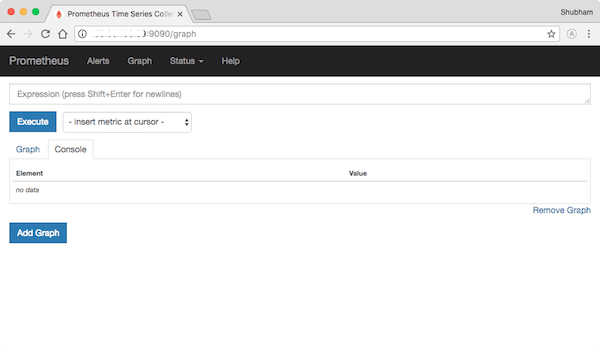How To Install Prometheus on Rocky Linux 9

In this tutorial, we will show you how to install Prometheus on Rocky Linux 9. Prometheus is an open-source monitoring and alerting toolkit designed for reliability and scalability. It’s particularly well-suited for dynamic environments like containerized deployments, microservices architectures, and cloud-native applications. By installing Prometheus on Rocky Linux 9, you’ll gain powerful insights into your system’s performance and health.
Prerequisites
Before we begin the installation process, ensure you have the following:
- A Rocky Linux 9 system with minimal installation
- Root or sudo privileges on your system
- Basic familiarity with the Linux command line
- A stable internet connection for downloading packages
System Preparation
To ensure a smooth installation process, we’ll start by updating our system and configuring some basic settings.
Update System Packages
First, let’s update all existing packages on your Rocky Linux 9 system:
sudo dnf update -y
sudo dnf upgrade -y
After the update process completes, it’s recommended to reboot your system to ensure all changes take effect:
sudo reboot
Configure Firewall Settings
Prometheus uses port 9090 by default. We need to open this port in the firewall to allow incoming connections:
sudo firewall-cmd --permanent --add-port=9090/tcp
sudo firewall-cmd --reload
Create Prometheus User and Directories
For security reasons, it’s best to run Prometheus under a dedicated user account with limited privileges:
sudo useradd --no-create-home --shell /sbin/nologin prometheus
Now, let’s create the necessary directories for Prometheus:
sudo mkdir /etc/prometheus
sudo mkdir /var/lib/prometheus
Set Up Directory Permissions
Ensure the Prometheus user has the correct permissions on these directories:
sudo chown prometheus:prometheus /etc/prometheus
sudo chown prometheus:prometheus /var/lib/prometheus
Installing Prometheus
With our system prepared, we can now proceed with the Prometheus installation.
Download Latest Prometheus Binary
First, we’ll download the latest Prometheus release. Check the official Prometheus download page for the most recent version. As of this writing, we’ll use version 2.45.1:
cd /tmp
wget https://github.com/prometheus/prometheus/releases/download/v3.0.1/prometheus-3.0.1.linux-amd64.tar.gz
Extract and Configure Binary Files
Extract the downloaded archive and move the Prometheus binaries to the appropriate locations:
tar xvf prometheus-3.0.1.linux-amd64.tar.gz
cd prometheus-3.0.1.linux-amd64
sudo mv prometheus promtool /usr/local/bin/
Set Up Configuration Directories
Move the configuration files and libraries to their respective directories:
sudo mv consoles/ console_libraries/ /etc/prometheus/
sudo mv prometheus.yml /etc/prometheus/prometheus.yml
Configure prometheus.yml
The `prometheus.yml` file is the main configuration file for Prometheus. Let’s edit it to suit our needs:
sudo nano /etc/prometheus/prometheus.yml
Here’s a basic configuration to get you started:
global:
scrape_interval: 15s
scrape_configs:
- job_name: 'prometheus'
static_configs:
- targets: ['localhost:9090']
This configuration tells Prometheus to scrape metrics from itself every 15 seconds. You can add more targets as you expand your monitoring setup.
Service Configuration
To ensure Prometheus runs as a service and starts automatically on boot, we need to create a systemd service file.
Create Systemd Service File
Create a new file named `prometheus.service` in the systemd directory:
sudo nano /etc/systemd/system/prometheus.service
Add the following content to the file:
[Unit]
Description=Prometheus
Wants=network-online.target
After=network-online.target
[Service]
User=prometheus
Group=prometheus
Type=simple
ExecStart=/usr/local/bin/prometheus \
--config.file /etc/prometheus/prometheus.yml \
--storage.tsdb.path /var/lib/prometheus/ \
--web.console.templates=/etc/prometheus/consoles \
--web.console.libraries=/etc/prometheus/console_libraries
[Install]
WantedBy=multi-user.target
Enable and Start Prometheus Service
Now, let’s enable and start the Prometheus service:
sudo systemctl daemon-reload
sudo systemctl enable prometheus
sudo systemctl start prometheus
Verify Service Status
Check if Prometheus is running correctly:
sudo systemctl status prometheus
You should see output indicating that the service is active and running.
Basic Configuration
With Prometheus installed and running, let’s look at some basic configuration options to get you started.
Configure Targets
To monitor additional targets, you’ll need to add them to the `prometheus.yml` file. For example, to monitor a Node Exporter running on another machine:
scrape_configs:
- job_name: 'prometheus'
static_configs:
- targets: ['localhost:9090']
- job_name: 'node'
static_configs:
- targets: ['node-exporter-ip:9100']
Replace `node-exporter-ip` with the actual IP address of your Node Exporter.
Set Up Scrape Intervals
You can adjust the global scrape interval or set specific intervals for different jobs:
global:
scrape_interval: 15s
scrape_configs:
- job_name: 'prometheus'
scrape_interval: 5s
static_configs:
- targets: ['localhost:9090']
Basic prometheus.yml Settings
Here are some additional settings you might want to configure in your `prometheus.yml`:
global:
scrape_interval: 15s
evaluation_interval: 15s
scrape_timeout: 10s
alerting:
alertmanagers:
- static_configs:
- targets:
# - alertmanager:9093
rule_files:
# - "first_rules.yml"
# - "second_rules.yml"
scrape_configs:
- job_name: 'prometheus'
static_configs:
- targets: ['localhost:9090']
Security Considerations
While this guide focuses on a basic setup, it’s crucial to consider security when deploying Prometheus in a production environment. Some key points to consider:
- Use HTTPS for all communications
- Implement authentication for the Prometheus web interface
- Restrict network access to Prometheus and its targets
- Regularly update Prometheus and all related components
Node Exporter Setup
Node Exporter is a Prometheus exporter for hardware and OS metrics. It’s an essential component for monitoring your Linux systems.
Installation Process
To install Node Exporter:
cd /tmp
wget https://github.com/prometheus/node_exporter/releases/download/v1.8.2/node_exporter-1.8.2.linux-amd64.tar.gz
tar xvf node_exporter-1.8.2.linux-amd64.tar.gz
sudo mv node_exporter-1.8.2.linux-amd64/node_exporter /usr/local/bin/
Configuration Steps
Create a systemd service file for Node Exporter:
sudo nano /etc/systemd/system/node_exporter.service
Add the following content:
[Unit]
Description=Node Exporter
After=network.target
[Service]
User=node_exporter
Group=node_exporter
Type=simple
ExecStart=/usr/local/bin/node_exporter
[Install]
WantedBy=multi-user.target
Integration with Prometheus
Add Node Exporter as a target in your `prometheus.yml`:
scrape_configs:
- job_name: 'node'
static_configs:
- targets: ['localhost:9100']
Service Management
Enable and start the Node Exporter service:
sudo systemctl daemon-reload
sudo systemctl enable node_exporter
sudo systemctl start node_exporter
Verification and Testing
After setting up Prometheus and Node Exporter, it’s important to verify that everything is working correctly.
Access Web Interface
Open a web browser and navigate to `http://your_server_ip:9090`. You should see the Prometheus web interface.

Check Targets Status
In the Prometheus web interface, go to Status > Targets. You should see your configured targets (including Prometheus itself and Node Exporter) with the state “UP”.
Verify Metrics Collection
In the Prometheus web interface, click on “Graph” and start typing metric names in the expression box. You should see autocomplete suggestions for various metrics.
Basic Query Testing
Try some basic queries to ensure metrics are being collected:
- For CPU usage:
100 - (avg by(instance) (rate(node_cpu_seconds_total{mode="idle"}[5m])) * 100) - For memory usage:
100 * (1 - ((node_memory_MemFree_bytes + node_memory_Cached_bytes + node_memory_Buffers_bytes) / node_memory_MemTotal_bytes))
Troubleshooting Guide
If you encounter issues during the installation or configuration process, here are some common problems and their solutions:
Common Installation Issues
- Permission denied errors: Ensure you’re using sudo for commands that require elevated privileges.
- Package conflicts: Make sure your system is up-to-date before installing Prometheus.
Service Startup Problems
If Prometheus fails to start:
- Check the service status:
sudo systemctl status prometheus - Review logs:
sudo journalctl -u prometheus
Configuration Errors
If Prometheus starts but doesn’t work as expected:
- Validate your configuration:
promtool check config /etc/prometheus/prometheus.yml - Check for syntax errors in your YAML files
Permission Issues
If Prometheus can’t access certain files or directories:
- Verify ownership:
ls -l /etc/prometheus /var/lib/prometheus - Adjust permissions if necessary:
sudo chown -R prometheus:prometheus /etc/prometheus /var/lib/prometheus
Best Practices and Security
To ensure the optimal performance and security of your Prometheus installation, consider the following best practices:
Security Recommendations
- Use TLS encryption for all Prometheus communications
- Implement authentication for the Prometheus web interface
- Regularly update Prometheus and all related components
- Use a firewall to restrict access to Prometheus ports
Backup Considerations
- Regularly backup your Prometheus configuration files
- Consider using remote storage for long-term metric storage
- Document your setup and configuration for easy recovery
Performance Optimization
- Adjust scrape intervals based on your specific needs
- Use service discovery for dynamic environments
- Implement recording rules for frequently used queries
Monitoring Recommendations
- Set up alerting for critical metrics
- Use Grafana or similar tools for visualization
- Monitor Prometheus itself to ensure it’s functioning correctly
Advanced Configuration
As you become more familiar with Prometheus, you might want to explore some advanced configuration options:
Alert Manager Integration
Alert Manager handles alerts sent by Prometheus server. To integrate it:
- Install Alert Manager
- Configure Alert Manager in your
prometheus.yml - Set up alerting rules in Prometheus
Custom Scrape Configurations
Prometheus supports various service discovery mechanisms. You can use these to dynamically discover and monitor targets in cloud environments or container orchestration platforms.
Additional Exporters
There are numerous exporters available for different systems and applications. Some popular ones include:
- MySQL Exporter for database monitoring
- Blackbox Exporter for probing endpoints over HTTP, HTTPS, DNS, TCP, and ICMP
- cAdvisor for container monitoring
High Availability Setup
For critical environments, you might want to set up Prometheus in a high availability configuration. This typically involves running multiple Prometheus instances and using a load balancer to distribute requests.
Congratulations! You have successfully installed Prometheus. Thanks for using this tutorial for installing the Prometheus monitoring system tool on your Rocky Linux 9 system. For additional help or useful information, we recommend you check the official Prometheus website.